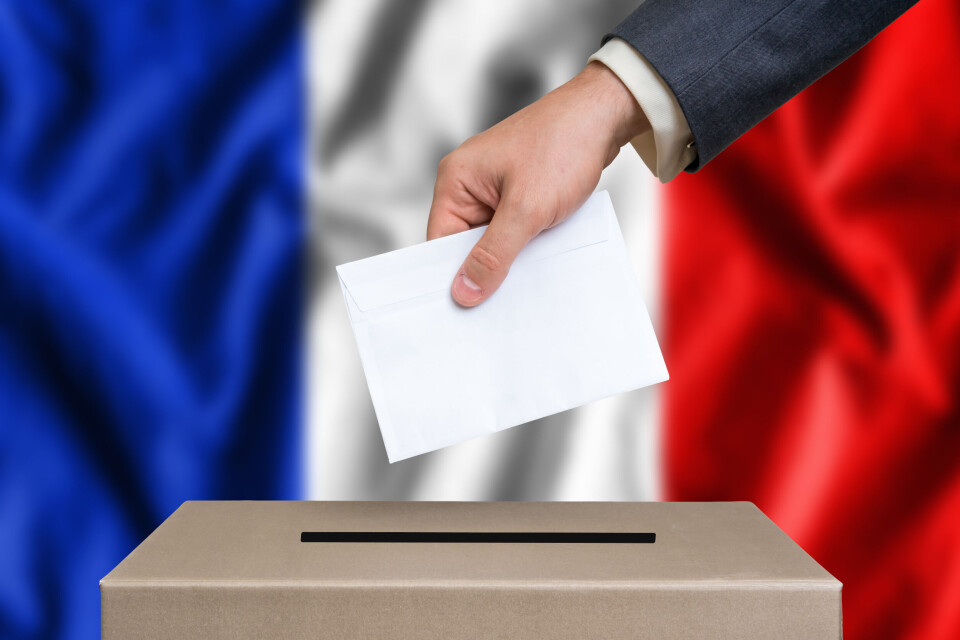-
Trump calls for Marine Le Pen to be freed (but she is not in prison)
US president said her embezzlement court case was a ‘witch hunt’
-
France’s €3 book delivery fee challenged in EU court by Amazon
Online retailer said measure is protectionist and ‘in breach of EU laws’
-
Allergies: How to know pollen levels in your commune of France
Interactive online maps can track and predict how pollen is changing in the air
French site pairs foreigners who want to vote with election abstainers
Alter-votants helped 1,000 foreigners vote in the 2017 presidential elections by matching them with French nationals. The site hopes to beat that number this month

Berthé is from Côte d'Ivoire (Ivory Coast) and has lived in France for five years.
Just like around five million other foreigners living in France, he does not have the right to vote in the presidential election this month. Only French nationals can vote.
But through a unique platform set up to pair foreigners who want to vote with citizens who plan to abstain, Berthé will vote for Jean-Luc Mélenchon in the upcoming presidential election, with the first round this Sunday (April 10).
Read more: When will we know the results of France’s presidential election?
Alter-votants was set up in 2016 ahead of the 2017 presidential elections and helped pair 1,000 foreigners with French citizens, who voted on their behalf. They tell the French person the candidate they want and they vote for that person for them.
In total, 5,000 foreigners signed up to the service, but not enough citizens volunteered.
Berthé will vote this year with the help of his partner Razan, who obtained French nationality in 2020.
“I feel strongly about the principle of giving foreigners who are living in France the right to vote,” Razan says in a video made by Alter-votants publicising the platform.
“It’s also to lead the debate about foreigners’ right to vote in France,” she says.
🇫🇷🗳️ Donner son vote à un étranger, plutôt que de s'abstenir à l'élection. C'est le choix de Razan qui va donner sa voix à Berthé, résident ivoirien, qui ne peut pas voter. La plateforme @altervotants veut remettre sur la table le débat du droit de vote des étrangers en France. pic.twitter.com/ARdslpiVqg
— Le Bondy Blog (@LeBondyBlog) April 4, 2022
Thomas Berteigne is one of the three co-founders of Alter-votants.
He told The Connexion that he believes the service is important because it gives recognition to foreigners living in France who cannot vote.
“We can see that there are some foreigners living in France who are completely integrated, who pay taxes, who are sometimes civil servants or work in hospitals.
“This is a recognition of them.
“Secondly, we are convinced that if we take into account votes from foreigners living in France, we would have less of a toxic culture around foreigners in the media.
“If tomorrow foreigners living in France were allowed to vote, I am sure that we would not talk about them in the same way as we do now in the media.
“Some candidates represent them as parasites, as rapists. If they were able to vote, I do not think it would be the same.”
The website is simple and provides a means for foreign residents in France to get in touch with citizens who want to offer their vote to them. It can be for the first and/or the second round of the vote.
You fill out a short form in which you put your name (it can be a pseudonym), your email address, phone number and state whether you have the right to vote or not.
There is a section to write comments, but Mr Berteigne said that it is not necessary to write your preferred candidate or political persuasion there.
“It is extremely rare that we get a situation where the foreigner is paired with someone who does not at all want to vote for the person they want them to,” he said.
“For example, this year we have not had that at all.
“When it does happen, we try to facilitate the process by creating a new pair. The French person or the foreigner can re-contact us at any moment and we can try to find them a new match.
“The goal is not to make people uncomfortable. It is after all a gesture that requires trust. There is no legally binding document that means the French person must vote for the candidate who the foreigner wishes.”
The French citizens who sign up to give their vote to a foreign have different profiles, Mr Berteigne said.
“There are those who are long-time abstainers, who do not vote, perhaps because they do not support the electoral system or do not feel it is representative.
“There are others who abstain from voting because they are perhaps not interested in politics, but they are keen to have an exchange with someone or to meet someone else.
“And then there are those who support the rights of foreigners in France and who are activists in this cause.”
In the 2017 elections, around 25% of the electorate abstained from voting, not including blank or spoilt votes.
Alter-votants states that around 70% of foreigners living in France have been in the country for over 10 years.
Read more: Voter abstention may hit record high at French presidential election
Mr Berteigne said that as someone who has been working in the field of foreigner rights in France for many years, he knows that it can be “extremely complicated” to obtain French nationality and take a number of years.
“We sometimes get foreigners writing us long messages explaining their situation, that they have lived in France for a long time but do not have the right to vote, and letting us know that they recognise the service that we are providing, and to say they are grateful to have the chance to express themselves,” he said.
“They are happy to vote, even if it is just symbolic, and also to have this exchange with another person in France.”
But not everyone is happy about the platform. He said they have received a lot of abuse and threatening messages from people with far-right views who do not like what they are doing.
“These are the people who want to have more democratic rights, so it is a bit contradictory - but we are used to that,” he said.
So far, they have 700 foreigners signed up to vote for this year’s election, and have created 100 pairs.
But since the beginning of this week they have been getting 200 to 300 requests each day.
“It’s taking off,” Mr Berteigne said.
“I hope we have around 300 pairs before the first round [on April 10] and for the second round I do not know, but our goal is to get better than in 2017, so more than 1,000 pairs,” he said.
“Some of the pairs we put in contact in 2017 have remained in contact, and they have organised themselves this year with the French person going to vote on the foreigners behalf.
“That is what we want.”
Related articles
Comment: Why don’t the French like the presidents they elect?
Votes, budgets, rules: how the French election works and quirky facts
‘We're proud to be voting in France for first time this election’
























